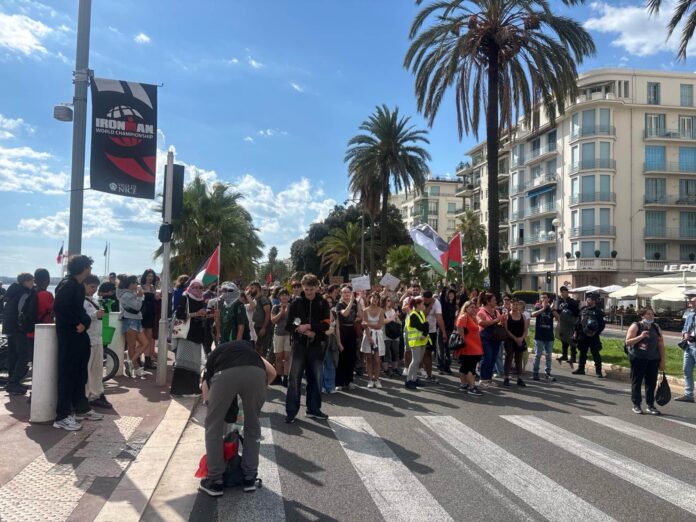Scheduled following the plan of former Prime Minister François Bayrou on July 15, social movements were organized in Nice on September 10, in the Magnan district and in front of the exhibition center. Here’s a recap of what happened.
Leaving at 2 PM from the Magnan district, nearly 500 people marched this Wednesday through the streets of Nice, at the call of the Student Popular Front and several youth organizations. The parade, mixing students, teachers, retirees, and precarious workers, crossed the city before reaching Thiers station where the rally ended around 5 PM.
“We have nothing left to lose, but a lot to defend,” breathes Clara, 21, a sociology student. She talks about skipped meals, impossible ends of the month. Next to her, Marc, a 25-year-old waiter, says he’s “exhausted“: “I work 35 hours on paper, 45 in reality. And in the end, I have nothing left.”
The procession is not just content to march. Some sing, others clap their hands. Hélène, a former 67-year-old teacher, walks among the students. She laughs: “I experienced May ’68. I find the same energy here, the same desire to say stop.”
In the background, political news stirs talk, the fall of François Bayrou, overthrown by a motion of no confidence the day before, and the express appointment of Sébastien Lecornu to Matignon, fuels discussions. “Lecornu or Bayrou, it’s the same story,” shouts a student on a megaphone. A union activist adds: “we change the face, not the policy.“
In the procession, the diversity of organizations present demonstrates the scale of the gathering. The Student Popular Front, the initiator of the call, leads the march, alongside local sections of unions such as Solidaires and the CGT.
Thibault Diederichs: “what’s at stake today goes beyond the budgetary issue”
Equipped with a sound system, Thibault Diederichs, co-president of the Popular Front in Nice, speaks: “What’s at stake today goes beyond the budgetary issue. It’s the future of our generation that’s at stake. We no longer want to pay for others’ crises; we want a society that puts youth and workers at the center.” His speech is punctuated by loud applause.
Leaflets from the Alternative Left circulate, titled “Bayrou is leaving… this is just the beginning!“, calling to turn this resignation into a social and ecological counter-offensive. “It’s not just a protest; it’s a societal project we’re defending,” explains an activist distributing the yellow and red leaflets.
But the mobilization is not unanimous. On the sidelines of the protest, the FACE 06 (Federation of Student Associations and Corporations of the Alpes-Maritimes) issued a statement criticizing the blockades organized in the morning on the Carlone and Valrose campuses, quickly closed by the administration. “The university is above all a place of learning, exchange, and diversity. The right to protest must coexist with the right to study,” writes the federation, which advocates for the campuses to remain open.
The situation of the protest in front of the exhibition center
The protest took place this Wednesday, September 10, at 2:30 PM, in front of the exhibition center, under the aegis of “Right to Housing 06.” The demands of the citizen groups are clear. “Greenpeace, like other environmental protection associations, are extremely dissatisfied with what has been done by successive governments. Their policies are destroying the environment, impoverishing people, and everyone loses,” argues Anthony, an activist with Greenpeace Nice.
During this meeting, more than a hundred people gathered to discuss in the manner of a citizens’ assembly and reflect on the difficulties encountered in the region and the possible solutions. “People are finding it increasingly difficult to live, to access the public services they are owed. We don’t all pay taxes the same way. There is massive fiscal injustice from big companies and wealth,” laments Olivier Salerno, co-representative of La France Insoumise in the Alpes-Maritimes.
The increased security at the expense of journalist protection
In the context of calls to demonstrate in Nice and throughout France, amid a politically unstable situation, the association Reporters Without Borders condemns the new prerogatives taken by the Ministry of the Interior and the national police. This document, published silently over the summer, negates all the progress made in terms of protecting journalists covering protests.
The announcement of the mobilization of 80,000 police officers and gendarmes across France and the resources used does not reassure RSF. “The Ministry of the Interior and the national police must urgently provide guarantees on the practice of journalism and the protection of reporters in situations of urban violence,” insists Thibault Buttin, the general director of RSF. For now, one uncertainty remains: will the social movement last in the long term?


